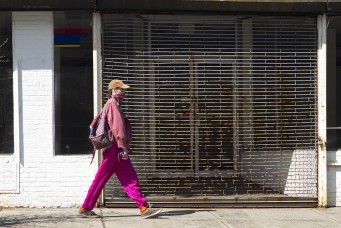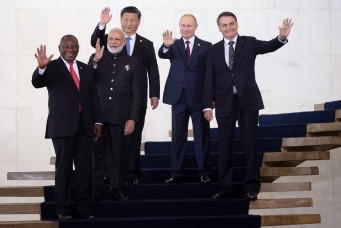COVID-19 and Social Policies in the MENA Region
A new test to overly-stressed systems.

A volunteer from the International Association for Relief and Development (ONSUR) distributes face masks to internally displaced children, ahead of the Eid al-Fitr Muslim holiday, amid concerns over the spread of the coronavirus disease (COVID-19), at an IDP camp in Idlib, Syria May 19, 2020. Picture taken May 19, 2020. Khalil Ashawi/Reuters.
COVID-19 brought a number of unsettling social and economic realities aside from its public health woes. The hope for a V-shaped economic recovery, a quick bounce back to where we were before the pandemic, is now a remote possibility. Job losses and economic recession, the magnitude of which are still unfolding, have triggered concerns of a protracted global economic crisis. According to one estimate by the United Nations (UN), the pandemic is set to push 130 million people to extreme poverty. The International Labour Organization (ILO) warns that some 1.6 billion workers in the informal economy, nearly half of the global workforce, stand in immediate danger of having their livelihoods destroyed. COVID-19 has created an unprecedented situation in modern history and a serious challenge for social policies to mitigate its social and economic impact.
To deal with such challenges, governments across the globe must give their best shot at effective social policies. I say best shot, because most governments are improvising with little consensus on the best set of policies to address this unfolding crisis. More than any time before, social transfer programs are becoming the fastest policy resort for many governments. In India, cash transfer schemes were instituted by eighteen states for construction workers, a group most affected by the lockdown in the country. In Egypt, a one-time cash transfer plan was introduced for casual workers. Canada devised a multi-pronged emergency aid program that transferred funds to support those who could not go to work and families with children.
Could COVID-19 be changing the face of social policies around the globe? The global trajectory of social policies has already been shifting dramatically. A “quiet revolution”, to cite a 2009 much-circulated article in the field by social scientists Armando Barrientos and David Hulme, has been brewing. The key marker of this revolution has been the growth of social assistance programs in countries in the global South in response to economic crises.
Notable examples of this “revolution” include Mexico’s Prospera program, which started in 1997 to provide cash to poor families (reaching almost 20 percent of the population) and providing them with regular preventive healthcare at local health clinics on condition they kept their children in primary or secondary schools. Another similar program is the Bolsa Familia (family grant) in Brazil, with a coverage level reaching 12 million households. India’s Mahatma Gandhi National Rural Employment Guarantee Scheme, which offered up to one hundred days of unskilled manual labor per year of public works, reaching 26 million households annually, is a third example of such programs.
This is a “quiet revolution”, it has been argued, in the sense that such programs constituted a slow yet drastic shift in social policies in countries in the South. Providing regular and reliable income transfers to those in poverty was long considered improbable given the limited budgets of such countries and the common fears of welfare dependence and system leakages due to corruption. The shift to such bold spending on social programs was seen as a major change in the social policy paradigm.
Social Protection in the Arab World
The academic literature on social assistance in the Arab world is relatively poor. The social policy landscape in the region has long been condensed to a handful of clichéd terms on challenges of system efficiency, skewed targeting, and poor efficacy. For decades, the social policy mix has been limited to universal subsidies of fuel and some food items (primarily bread), access to free health and education services (albeit with concerns of quality), and a selective public sector hiring system that provides relatively generous conditions to the educated—leaving the rest of the population to struggle with predominantly dismal working conditions in the private sector. For a long time, students of social policies in the Arab region had very few interesting models to parade similar to those of Latin America and India.
This has been changing more recently. Major economic and political pressures in the region and the influx of refugees from conflict-affected countries were some of the direct triggers of such policy change. The models from Latin American countries informed a new wave of cash transfer programs in the region. Notable examples include Egypt’s Takaful and Karama, which was initiated in 2015. Takaful (social solidarity) is Egypt’s first cash transfer program targeting poor families with children. Karama is its sister program that focuses on elderly people. In 2019, both programs reached more than two million families. Morocco also started its Daam (support) program—previously piloted under the name Tayssir—in 2014. This cash transfer program targets widows with children and has reached almost ninety thousand beneficiaries. Jordan provided cash assistance programs to the influx of Syrian refugees. Its partnership program with the UN High Commissioner for Refugees reached 671,650 Syrian refugees in Jordan in 2018. Jordan’s National Aid Fund (established 1986) also expanded its outreach. Similarly, Tunisia expanded its social assistance program (Programme National d’Aide aux Familles Nécessiteuses, or more commonly PNAFN), doubling its outreach from forty thousand children in 2010 to 285,000 in 2018.
The region also witnessed a sprawling of youth-focused employment programs post the Arab Spring. In Tunisia, the Active Employment Search Program for university graduates, known as AMAL (“hope” in Arabic), was introduced early in 2011 to offer unemployed university graduates with career coaching, training, and a monthly stipend for up to a year. Similarly, Egypt introduced two limited-term subsidized employment programs, providing temporary employment through labor-intensive projects in 2013. Even in countries that were spared the political turmoil of leadership change in the region, state-funded youth employment programs witnessed a boost following the 2011 uprisings. For instance, the Algerian government dedicated $4.7 billion to encourage job creation with a focus on university graduates and graduates of vocational training programs.
Existing Challenges and the New Test of COVID-19
Even with the introduction of these programs, only one in three people in the poorest quintile (poorest 20 percent) in Arab countries are covered through income support transfers. This means that Arab countries have a long way to go in terms of coverage expansion.
Global policy “borrowing”, with ideas floating across borders, is a common tradition in social policies. Only very recently, however, did students of social policy start to realize that the celebrated cash transfer models of the “quiet revolution” in Latin America were not without challenges. One often-highlighted issue is that while families receive funding on the condition of seeking health and education services, the quality of the services offered hampers the efficacy of this conditionality. Another criticism has been that the limited income that these programs provide to the poor does not support their graduation from poverty. These challenges were most vocal early in 2019, when Mexico’s program Prospera was abolished due to persistent high poverty rates.
More seriously, a social policy approach that is limited to social assistance programs leaves out the majority of the population facing the precarity of economic shocks, similar to the one instigated by COVID-19. Social assistance programs are often described as “residualist” because they focus on people at the bottom. Cash transfers are meant to address sustainable development goals pertaining to ending extreme poverty and hunger. There is a humanitarian value to these programs along with their developmental objectives. The not so poor, however, remain excluded from a social policy approach limited to this modality.
Social insurance programs, which rely on contributions paid by workers for the buildup of retirement pensions, are ideally the cushion for those above the threshold of assistance programs. By definition, social insurance programs include all formalized systems of pensions, health insurance, paid leaves, maternity benefits, and unemployment benefits. They are usually provided with tripartite financing between employers, employees, and the state. In most Arab countries, however, the coverage to contributory social insurance programs is limited to one-quarter of the workers, according to data from the ILO.
COVID-19 has particularly tested this weakness. While the ultra-poor are targeted by social transfers, those who lose their jobs from the not so poor have no support options in the absence of effective social insurance programs. Without effective unemployment benefits, workers who lose their jobs are forced to spiral down to poverty. The weak coverage of social insurance systems and the deficiencies of these programs in terms of actual access to benefits both form a serious weakness vis-à-vis the test of COVID-19.
If we think of social policies as a ladder of interventions, cash transfer programs would be placed at the bottom as a minimal requirement. A next step—one that many middle-income countries fail to reach including in the Arab region—is to have more inclusive social insurance systems that would provide benefits to workers based on contributory schemes.
Where To?
If we are going to learn from the experience of Mexico, Prospera was replaced by two major initiatives. The first is a universal scholarship program, Becas Benito Juarez, which gives grants to students to access secondary education in public schools. The second is a universal old age pension program. Mexico’s shift from Prospera to these two universal access programs brings to the fore the biggest current debate in social policies: the viability of universal basic income (UBI). UBI is generally provided in the form of periodic cash transfers to citizens in order to provide living standards above the poverty line.
On the face of it, UBI might seem to be a utopian proposal, too good to believe and too expensive to implement. However, countries as diverse as Kenya, Finland, Namibia, India, and Canada have experimented with this model, applying it to different segments of their populations.
UBI remains a debated issue in social policies. Proponents argue that the payments could help stabilize the economy during recessionary periods, would allow the poor to invest in human capital instead of being trapped in low-productivity jobs, would cost less in terms of implementation compared to other programs such as food subsidies or even conditional cash transfer programs, and would constitute an economic stimulus by increasing the purchasing power of vulnerable people. Opponents argue that it might increase inflation, encourage idleness, and lower productivity. Countries in the Arab region might be particularly challenged by the constrained governance capacity for income reporting and efficient taxation to allow for the fiscal space for effective UBI implementation.
COVID-19 is an urgent call for social policy reforms. Packages are desperately needed for those who have lost their jobs. This would involve expanding the policy response beyond the social assistance programs that are limited to those at the bottom. There is serious need for labor market policies that reach out to workers in the informal economy with a mix of contributory and non-contributory schemes, unemployment protection schemes to support enterprises to retain workers, and income support to the unemployed. Reforming social insurance systems to expand their level of coverage as a percentage of the working population and to avail their benefits to those covered is a cornerstone for this needed policy response.
It is hard to predict which experience will be hailed most in the social policy field in the coming decades—the next “quiet revolution”. However, a crisis of the magnitude of COVID-19 is bound to push for change. What we know is that we cannot limit social policies to people at the bottom at a time when everyone is affected. We also know that the majority of workers who are part of the informal economy, without access to social insurance benefits, are bound to suffer most. COVID-19 might be the wake-up call for regional comprehensive social security programs that will reach the diversity of people at the losing end of society in the wake of this global pandemic.
Ghada Barsoum is Associate Professor (with tenure) and currently Chair of the Department of Public Policy and Administration at the American University in Cairo (AUC). Her research interests include gender, employment, social policies, and higher education. Barsoum has numerous publications in reputable international peer-reviewed journals including Review of Public Personnel Administration; International Journal of Education Development; Gender, Work and Organizations; International Journal of Social Welfare, and Current Sociology. She is also author of a book on the employment crisis of female graduates in Egypt, and a number of book chapters, technical reports, published policy papers and encyclopedia entries. She has consulted for the International Labor Organization, UNESCO, UNFPA and UNICEF. While at AUC, she has been the principal investigator of projects with funding from the Ford Foundation, the United Nations Development Programme and Friedriech Ebert Foundation. Prior to joining AUC, Barsoum was Research Associate at the Population Council, West Asia and North Africa Office, where she spearheaded efforts for a national survey on youth in Egypt. Barsoum obtained her PhD in Sociology from University of Toronto and her Master’s degree from AUC.
Read More




